How to make it in Gamedev as an artist?

Working in gamedev is the dream of many novice artists. After all, games are a form of entertainment that attracts millions of people around the world, and the most valued productions are appreciated for their quality and artistic features, among other things.
This is not only an opportunity to show your skills to the whole world, but also to create something unique and maybe even legendary? So all you have to do is get to work, but how? We asked Katarzyna Zielińska, our Lead Environment Concept Artist, what steps a novice artist can take to get into the industry.
Your first step towards gamedev was...
When I was in college, I met a team of people who studied at the computer science department and made their own game after hours, and I joined them. As an interesting side note, I can add that at the age of 11-12 I started learning programming on my own and wrote a simple side-scroller with graphics drawn in Paint. However, I don't consider it a career milestone.
At that time, you studied architecture and later worked in this profession. What I'd like to ask you, though, is how long it took you from starting to deal with games full-time to getting into AAA.
4 years passed from the moment I only dealt with games until the day of employment at Techland, and today it seems to me it was relatively little time. The truth is I was working a lot back then. I would even say I was at the end of my tether and I think this is something very common among artists.

So you need to be patient, right?
The generation of artists who are experienced seniors today have worked and made careers in the so-called hustle culture. The desire to achieve success, but also the passion for games and reaching for more, made many of them work so much that it ultimately affected their health or ended in total professional burnout. From my perspective, I would like to tell beginners that a career in gamedev is not a sprint, but a marathon. You have to start with the awareness that if you want to stay in this industry for longer, you can't exhaust yourself during the first few years. So if you really want to do it, then in my view it's better to take a few years longer to get to a given position than to pay for a quick promotion with your health.
You must meet a lot of beginners on your way who would like to enter gamedev. From the perspective of your career, do you think it is easier or harder for them to enter the industry these days?
I started 13 years ago in a completely different reality than today. What I really like now is that many professional artists are active on social media and you can learn a lot by watching them, because they share a lot of practical knowledge. They create their own tutorials, speak at conferences, and there are plenty of podcasts as well as videos that can teach you a lot on YouTube itself. It's definitely much easier than it used to be in this respect.

Where should you start if you dream of working on large games?
You should definitely just start making games. From my perspective, assuming we are looking for a junior, when recruiting people with a similar level of portfolio we notice that one of them has already worked on a game, even if it was just a hobby project, I look more favorably at such a candidate. Thanks to this, I know he or she is someone interested not only in art, but also in development, and that he or she is a person who has experience in teamwork and will better understand the complexity of the video game product. Of course then, these skills still need to be checked during an interview or a trial period.
Here is an example of one of the interiors I designed for DL2SH. I made the base for the concept in our editor using existing assets, and then painted the missing elements that needed to be made in 3D. I also proposed lighting on the underpainting. I had to discuss each of the new elements with modelers. The prefab with the base decoration that I initially built was used in the final game, so thanks to that I was responsible for the level art in these locations. As you can see, the work of a concept artist at Techland is not limited to creating projects in 2D.
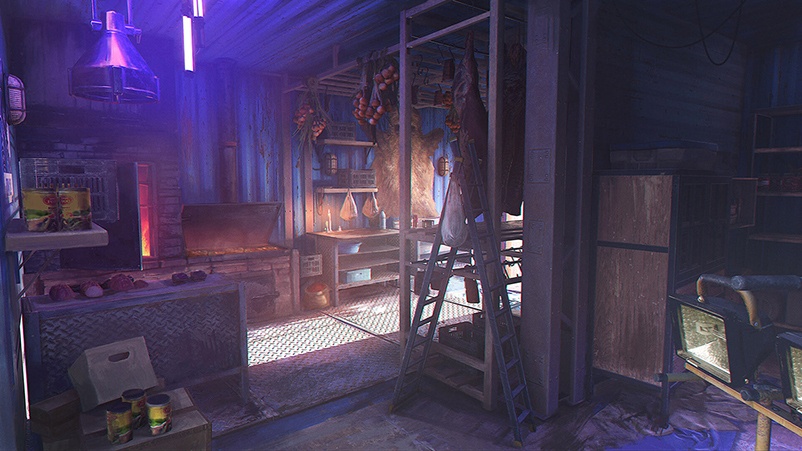
So it's not only the level of graphic skills that counts?
Many beginners imagine our work as just making pretty pictures. However, a concept artist and an illustrator are two different specializations. Concept art is not the final asset in a game. These are projects that are then implemented by other specialists, e.g. 3D or Level Artists. Our task is often to suggest the atmosphere, story or emotional overtones of a given place. This means that yes, aesthetics are important, but we also have to think about functionality. About the fact that, for instance, a given place is supposed to be scary or has a specific type of gameplay planned. And the trick is to design a given space in such a way that the player experiences what we plan for him or her.
Therefore, if someone wants to enter gamedev, they must not only love games, but by playing them try to understand them and be able to analyze, for example, how we guide the player through the specific appearance of places and provoke certain emotions in them. Each of our "pictures" is created for a very specific purpose.
Here is an example of a concept I created when we needed to define the appearance of places where players meet the so-called storytellers, thanks to whom we can learn more about the history of this world. They were supposed to be places that offer the fantasy of stories around a campfire or a small traveling theater. From a gameplay point of view, we wanted two sizes of these locations, so that they could be placed on different sizes of roofs. It was also supposed to be a space where the player would feel safe. An additional production challenge was to propose the use of as many existing 3D assets as possible. Also on my side was the preparation of flat paintings suggested in the concept, which were then transformed into textures on objects. At every stage of the creation of this project, I consulted it with the Art Director, World Director and the art environment department.
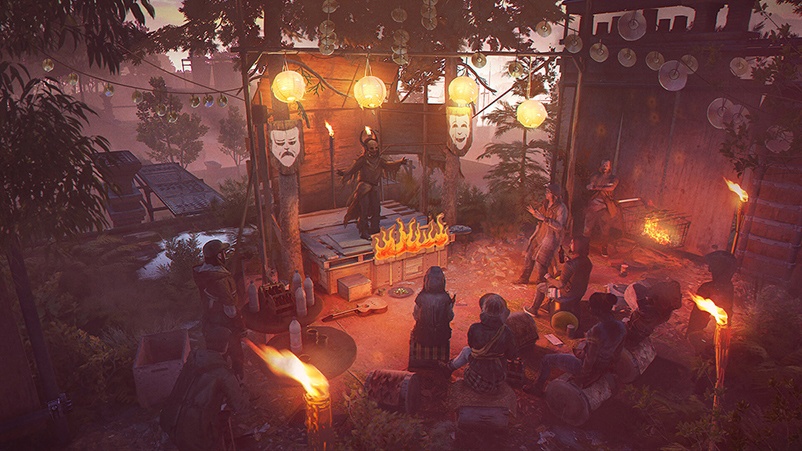

What other skills are worth honing?
Definitely English, which you need to know in speech and writing at a level that allows you to communicate freely. This is important, because in large studios in Poland you will definitely cooperate with non-Polish-speaking people. And both communication as well as company-wide documentation will be conducted in English.
In terms of artistic skills themselves - here, it is worth looking for courses at English-language websites, such as CGMA or Schoolism, and following your favorite artists on the Internet. Some of them offer various types of tutorial guidance. I would certainly avoid schools and classes that are not taught by artists working in the industry.
Let's imagine that I am a novice artist, I send my CV and portfolio to various companies and there is silence all the time. What would you advise me to do?
At some point, the only good option may be to simply contact artists working in the industry directly and ask them for feedback. Here, I recommend participation in conferences, workshops and various industry events. There are several conferences dedicated to artists and even if the ticket price can be quite high, I think it is a worthwhile investment. You can meet a lot of new people working in the industry and have the opportunity to present your portfolio to potential employers.
If someone does not have such opportunities, they can also make electronic contact, but here is a "but"... Usually, highly experienced people are also ones that are very busy and if you send them a private message via social media or email, you must reckon with the fact you will not get answers. And it's not because these people are deliberately ignoring you, but they just get a lot of such messages and don't have time to reply to all of them. And here I’d like to express an important request - do not take it personally if you don't get an answer. Just because someone doesn't answer doesn't mean you’re a bad artist. It's just that an artist, like any other person, has his or her own life and it can be difficult for them to find time for it outside of work.
I would also advise you to reach out to someone who works at the level you are interested in, or at the company you want to work for. Depending on the studio, the requirements for a similar position may be different and you will have to adapt to them.
And here we come to an interesting topic - the portfolio. The fact you must have it is obvious, but perhaps you have an extra piece of advice?
First of all, it has to be on topic. You need to be aware of where and what type of projects you want to work on. It is worth having it online, so that people potentially interested in working with you have easy access to it. This approach has helped me a lot, because when I prepared a portfolio especially for Techland, I quickly got a job here. It was similar in the case of cooperating with Magic: The Gathering. One of the artists creating illustrations for this game shared my work on Twitter and soon after that I was offered a collaboration.
Here are a few boards from one of the projects I prepared for my portfolio when I wanted to land a job at Techland. I researched all the publicly available information about Dying Light 2 very thoroughly and created designs that were meant to fit into this world, while also offering fresh ideas for it. It was equally important for me to convey my way of thinking from the first sketches, references, inspirations to the final concept. By the way, these individual steps in the process of creating a concept are something that I often miss in candidate portfolios.
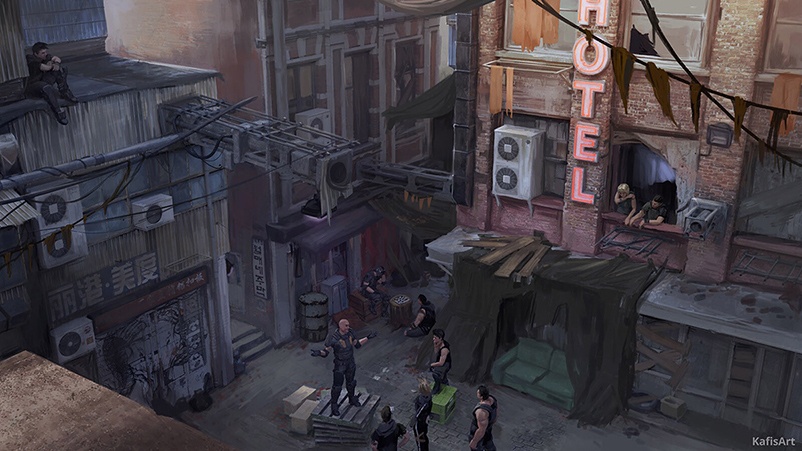
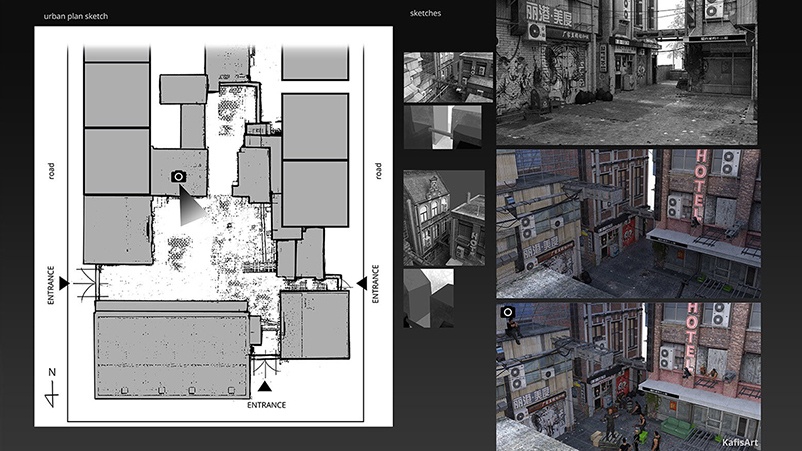
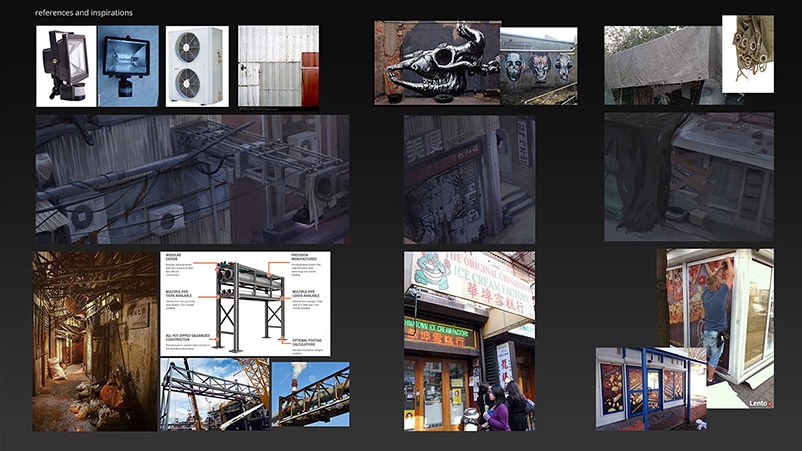
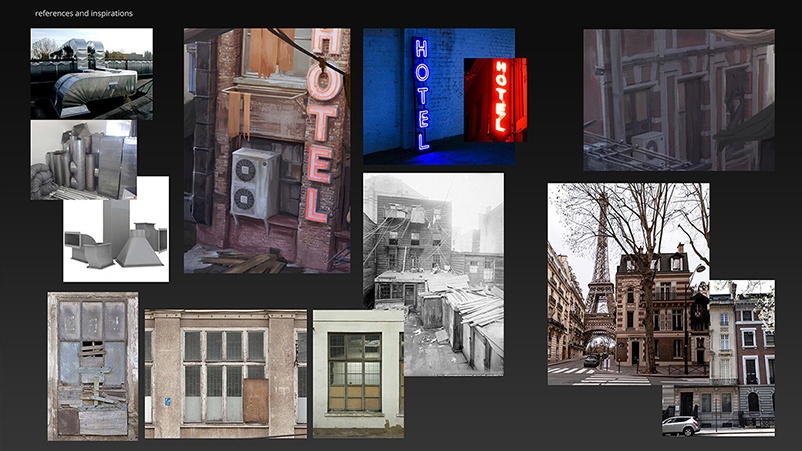
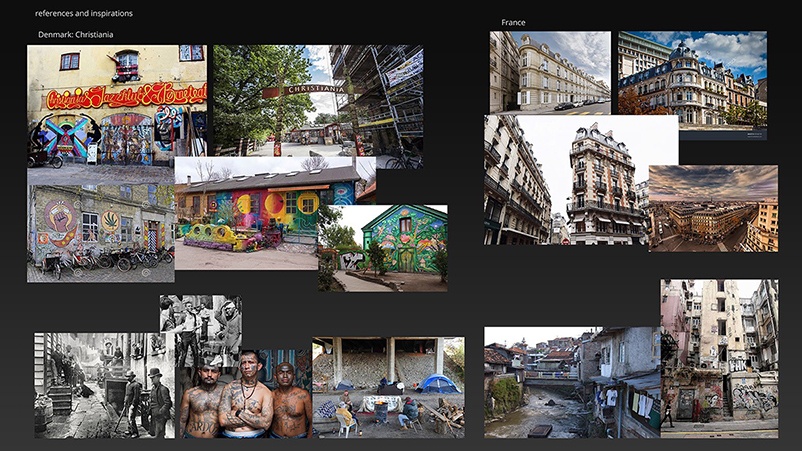
Back to the subject of social media. Our activity in them can help attract the attention of art directors. On the other hand, many people who start posting their work on the Internet have high expectations regarding a large number of likes and reach, while it doesn’t always happen... Besides, many of the best specialists are not found in social media or do not participate in them so much, so there are no rules for that. Posting your work online can help, but I don't think it's the key to getting a job in the industry and making a career out of it.
I see one difficult aspect in the work of an artist, namely accepting feedback about your own work. Do you think it's hard for beginners?
It can be, sometimes. You have to grow up to a certain level of professionalism and remember that feedback at work is aimed at getting the best effect in the game. This is not a criticism of you. Be aware that if you are just starting out in the industry, you will make a lot of mistakes and you will need a lot of support from more experienced artists. And that's perfectly fine. Knowing how to receive and give feedback is something you just have to learn. It will get easier with experience, while good feedback can greatly accelerate your development. I have seen many times how the right work environment, which supports good feedback, can lift someone up very quickly. I can proudly say that my team matches the definition of such a place.
The most common mistakes that beginner artists make?
The first one is confusing concept art with illustration. I believe the industry itself is to blame here, as it often boasts of finished and most effective concepts that are closer to illustrations. We also do such things at work, but in my experience it is a small fraction of the types of tasks that a concept artist performs. The second mistake that is repeated extremely often is not working with references or not understanding them. Here I recommend humbly assuming that you do not know what everything in the world looks like and how it works. It is better to spend more time looking for references so that the final project is of a higher standard.
Being a top artist sounds like a dream come true, but I will perversely ask - does it have any downsides?
Well, no matter how big and recognizable projects you work on, in the end, we are all nerds who often sit for more than 8 hours a day at the computer. Personally, I don't like idolizing artists too much.

One final piece of advice for aspiring artists?
Each of us has a different background and accumulated experience. What works for one person doesn't always work for another. We could have grown up in a different environment, had different opportunities or financial situations. Hence, it may be easier for some and harder for others to reach the place in their careers where they would like to be. It is worth remembering that we do not all start from the same position and there is no point in blaming ourselves for things over which we have no influence.
